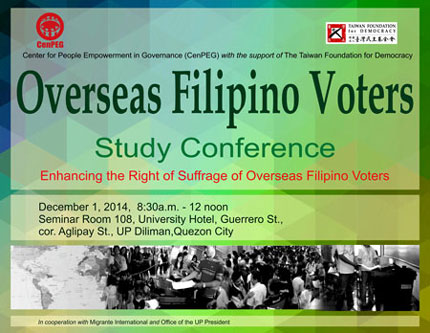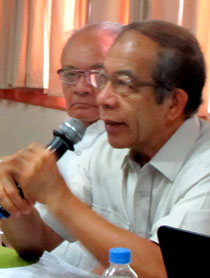Remittance with Representation: The right to vote of overseas Filipinos
CenPEG.org
Dec. 4, 2014
2014 is the 10th year of overseas voting for migrant Filipinos living and working abroad. Out of 10mn migrant Filipinos distributed in almost 200 countries, more than 4mn are temporary or are working. Most of them are eligible voters – those who exercise their right to vote under the Overseas Voting Act of 2003.

Since the law’s enactment, four elections have been held – 2004, 2007, 2010, and 2013. From a relatively high voter turnout of 65% in 2004, however, the turnout has dropped to a dismal 16% in 2013 – 118,823 out of 975,263 who registered.
With a large percentage of eligible overseas Filipino voters disenfranchised of their right to vote, the issue of remittance with representation has been raised. Last year, overseas Filipinos – many of them overseas Filipino workers (OFWs) - remitted some $23bn or 9% of the country’s GDP. Despite their helping prop up the country’s economy, inability to cast their vote during elections could still mean limited or zero representation in government policy making and governance.
For its initial appraisal of overseas Filipino voting, CenPEG held a study conference, “Enhancing the Right of Suffrage of Overseas Filipino Voters: Cutting-Edge Solutions,” on Dec. 1, 2014 at the University of the Philippines, Diliman, Quezon City. The conference was attended by representatives and members of Migrante International, seafarers, and other migrant Filipinos based in the Middle East, Hong Kong, and the U.S.; as well as election watchdogs like AES Watch and NAMFREL. Also in attendance were officials and staff of the Department of Foreign Affairs, the Comelec Advisory Council, and Congress like the Joint Congressional Oversight Committee (JCOC).
CenPEG Policy Studies Director Bobby M. Tuazon, in his presentation, appraised the low voting trend among overseas Filipinos with identified problems persisting since 2004 – such as travel difficulties, employer restrictions on overseas Filipino workers (OFWs), as well as registration and voting restrictions. Based on the experiences in others countries with overseas voting rights, Tuazon said, migrant voters’ disconnect with their home countries, unfamiliarity with election and political issues, and some restrictions in their host countries posed limitations to suffrage rights. Lack of trust in their own governments, in the election process, and in the failure of voting to make a difference in terms of being responsive to their own issues have also dampened the participation of millions of overseas voters even from such “democratic countries” as the U.S. and western Europe.
Pablo R. Manalastas, CenPEG Fellow for IT, commented on the use of internet for overseas voters’ registration for the 2016 elections.
Migrante International president Connie Bragas-Regalado talked about the OFWs’ groups policy demands, including making the overseas voting registration systematic, widespread, and accessible; a massive voter education drive by the government; special attention should be given to vulnerable sectors among the overseas Filipino voters particularly domestic helpers and caregivers; increasing the budget for the implementation of the overseas voting act; and e) establishing and regularizing embassies, consulates, and missions and their services in countries where there large concentrations of migrant Filipinos.
Migrante’s network responded to CenPEG’s survey questions on overseas Filipinos’ attitude to overseas voting in several countries. The survey, among other findings, revealed that 58% voters who used the precinct count optical scan (PCOS) machines of Comelec and foreign outsourcing company, Smartmatic, did not know or were unsure whether their votes were counted in the 2010 and 2013 elections.
CenPEG Executive Director Evita J. Jimenez served as conference moderator while Board Chair Temario C. Rivera gave the opening remarks and synthesis.
The conference on overseas voting was held in cooperation with the Office of the UP President and with the support of the Taiwan Foundation for Democracy (TFD). CenPEG News

CenPEG chair Temario Rivera opens the conference. CenPEG photo
.jpg)
Dr. Pablo R. Manalastas, CenPEG Fellow for IT, tackles internet registration issues. CenPEG photo
.jpg)
Migrante International’s Connie Bragas-Regalado speaks on behalf of overseas Filipino workers. CenPEG photo

Foreign affairs department’s acting chair for Overseas Voting Secretariat Edgar Castro responds during a session. CenPEG photo
- Probing presidential platforms
- Conference calls for people-centered policy actions for Asian development and peace
- WWII 'comfort women' urge visiting Japanese emperor: OFFICIAL GOV’T APOLOGY, UPHOLD TRUTH, and JUST COMPENSATION
- FEARLESS FORECAST (EPISODE II): Comelec will not comply with e-Commerce Law in 2016 elections
- Fearless forecast: Comelec’s non-compliance with the AES law in 2016 (last of 2 parts)
- Fearless forecast: Comelec will not comply with the AES law in 2016
- CenPEG releases travelogue
- Experts: Nuisance bets reflect disillusionment, uneven playing field
- Partylist solon presses for tax cuts
- The True Cost of a Political Campaign
- Management decisions: Based on RA 9369 or purely Comelec’s?
- CenPEG holds 1st roundtable with media on presidential poll results
- Filipino IT can do it!
- FIT4E: The only transparent solution
- Realpolitik in the maritime tiff
- China’s challenge to PH sovereignty
- Choosing the next president
- Fixing the presidency, reforming the state
- New Comelec chair says he’s open to other election technologies
- SC ruling on AES Watch Pabillo and IBP vs Comelec, Smartmatic-TIM
- Comelec must explain P3.2B unliquidated cash advances
- CONGRESS ASKED TO HOLD DEMO ON PCOS HACKING
- 25 Bishops ask poll body to stop midnight deal with Smartmatic
- Pope Francis: reform and conversion
- 2 poll watch coalitions stage rally vs Comelec-Smartmatic midnight deal
- AES Watch questions Comelec-Smartmatic midnight deal
- ASEAN-India: Building Youth Partnerships through Culture and Entrepreneurship
- CenPEG forges research exchange and partnership with Jinan University
- FOI: Bearing fruit or foiled again?
- Remittance with Representation: The right to vote of overseas Filipinos
Center for People Empowewrment in Governance (CenPEG), Philippines. All rights reserved


